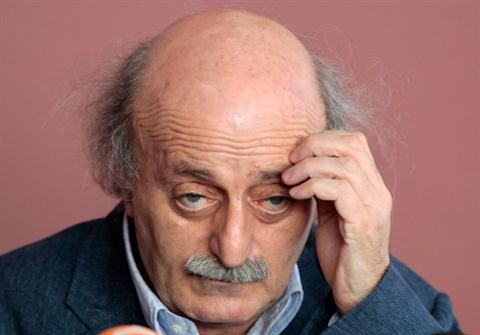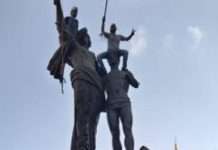Future and Hezbollah to tackle sectarian tensions
Hussein Dakroub/The Daily Star/ 05, 2015
BEIRUT: The Future Movement and Hezbollah will hold a second round of talks Monday focusing on ways to defuse political and sectarian tensions stoked by the war in Syria, officials said Sunday. MP Michel Aoun, meanwhile, said a planned meeting with his Christian rival, Lebanese Forces chief Samir Geagea, was on track as the two sides worked on a joint blueprint for the talks. Senior officials from the Future Movement and Hezbollah are scheduled to meet at Speaker Nabih Berri’s residence in Ain al-Tineh at 6 p.m. Monday, in the second session of a dialogue launched last month with the aim of easing Sunni-Shiite tensions and facilitating the election of a new president.
“The two sides will discuss Monday necessary measures to defuse sectarian tensions,” a member of the Future-Hezbollah dialogue told The Daily Star. Speaking on condition of anonymity, he described the first dialogue session sponsored by Berri at Ain al-Tineh on Dec. 23 as an “ice-breaking meeting” between the two rival influential parties, whose strained ties have heightened political and sectarian tensions and sometimes put the country on edge.
Defusing Sunni-Shiite tensions is the main item on the dialogue agenda which, according to officials from both sides, also includes finding a mechanism to allow the election of a president, boosting efforts to combat terrorism, promoting a new electoral law and energizing stagnant state institutions. Berri, the architect of the Future-Hezbollah dialogue, was quoted by Ain al-Tineh visitors as saying Sunday: “This item [Sunni-Shiite tensions] will be discussed seriously and in depth. It needs joint cooperation which I had felt from both sides in the first session of dialogue.”“This dialogue has a national objective and is not merely a Sunni-Shiite dialogue,” he said.
Berri also dismissed fears that the dialogue would lead to the formation of a new four-party alliance, grouping in addition to the Future Movement and Hezbollah, the Amal Movement and MP Walid Jumblatt’s Progressive Socialist Party. “No, it will not lead to such an alliance,” he said, adding that the statement issued after the first dialogue session was clear in stating that any agreement reached by the two sides would take into consideration all the parties and the country.
Asked to comment on the planned dialogue between Geagea and Aoun, the Free Patriotic Movement leader, Berri said: “This dialogue, which we have encouraged, was a natural reaction to the dialogue between Hezbollah and the Future Movement.” Berri will not attend Monday’s session. Instead, he will be represented by his political aide, Finance Minister Ali Hasan Khalil. Last month’s meeting was the first face-to-face encounter between Future and Hezbollah officials in four years since the Hezbollah-led March 8 alliance toppled former Prime Minister Saad Hariri’s national unity government in January 2011.
Reducing sectarian tensions demands that Future and Hezbollah politicians as well as their TV outlets halt media campaigns and the war of words against each other which have been blamed for inflaming sectarian sentiments among supporters of the two sides. Prime Minister Tammam Salam as well as Future MPs and rival politicians have voiced hopes that the Future-Hezbollah dialogue would help break the 7-month-old presidential stalemate.
In addition to gaining support from rival politicians, the Future-Hezbollah dialogue has also won backing from Egypt as well as the U.S., Saudi and Iranian ambassadors in Beirut. It has also encouraged the two rival Maronite leaders, Aoun and Geagea, to meet to bury the hatchet and try to find a solution for the presidential crisis. FPM and LF officials have been holding talks to agree on a final agenda for a meeting between Aoun and Geagea, both of whom are vying for the presidency seat. While Aoun is backed by Hezbollah and its March 8 allies, Geagea is supported by the March 14 coalition for the country’s top Christian post.
For his part, Aoun refused to withdraw from the presidency race, saying he stood a chance to be elected a president. “I have a chance [to win the presidency],” he said in an interview with Al-Jadeed TV Sunday night. Aoun said he did not even rule out the possibility of LF lawmakers voting for him for president. “It will not be a divine miracle,” he said of the LF’s possible support for his presidential bid.
For security reasons, Aoun refused to give a final date or the venue of his upcoming meeting with Geagea, saying efforts were underway by the two sides to reach a joint working blueprint. “The main topics of the dialogue are the Christians’ rights in the country’s political life, an electoral law, the presidential election and the president’s qualifications,” he said. “We have to defend the rights of the Christians.” He added that he would discuss with Geagea “many thorny issues that concern the Christians and the country as a whole.”
Aoun rejected Geagea’s call to search for “a third candidate” to break the presidential deadlock. He said he would not again vote for a consensus president as he did with the election of former President Michel Sleiman under a deal reached by the rival factions in Doha, Qatar, in May 2008 following a political deadlock that left the country without a president for more than six months.
“We want a president who can represent the majority of the Lebanese people. This is an essential condition,” Aoun said. He added that the next president should be capable of tackling the country’s problems and carry out change and reforms in the state’s structure, which he said was crippled by corruption, negligence and the absence of accountability.



















